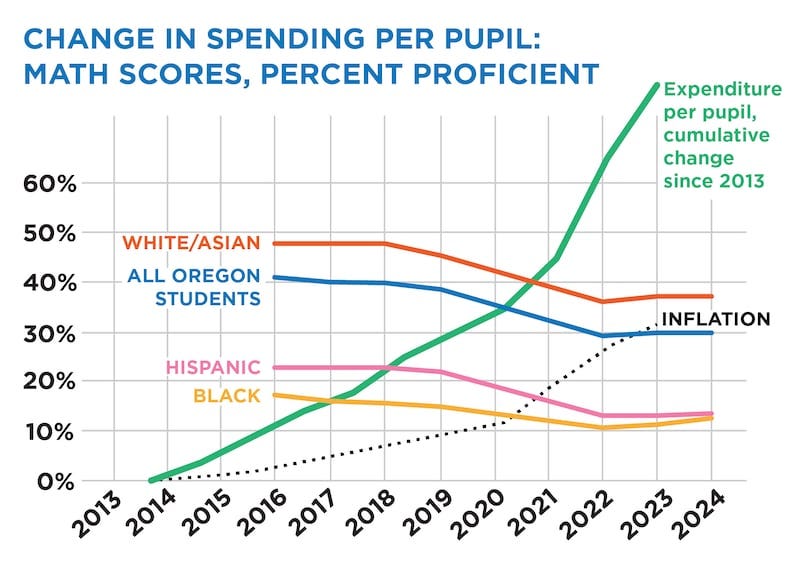The School Bond (Ballot Measure 26-259) is controversial, and it should be. It’s a bloated mess that feels rushed out in time for our May Special Election. I went over my endorsements for school board last time, so let’s discuss that bond. I’m still hoping to rope some interesting people into Substack Live discussions as the deadline draws closer but I’ve got people antsy to vote and get their ballots returned.
Here’s the voter’s pamphlet link again in case you need it.
First, you should come to Future Portland’s Ballot Party & Candidate Forum on May 10th at the Rogue Eastside Pub & Pilot Brewery. Full disclosure: I volunteer with Future Portland and have voted as a part of their endorsement committee. I have no leadership role within the org. We are separate but friendly entities. Vikki never listens to me, no matter how right I am. I tried to turn FP into my own private Portland for All but those jerks won’t let me.1
My endorsement: Vote NO
I’m hoping a few pro-bond candidates will defend themselves at the event and explain the urgency I am about to argue against. There’s always a bit of the old “what, you don’t care about our students?” when it comes to school bonds. Voting against a ballot measure like this can feel like voting against students or teachers - but that’s just voting with your emotions! This bond won’t prevent layoffs, fund a threatened music program, or stop a school from closing.
The bond will continue PPS’s plan to overhaul and update its school buildings. An ambitious campaign we started funding in 2012 (more on that in a bit). And, let me be clear, we do need a bond to finish this modernization effort. My argument is that we don’t need this bond. Every time a new stage of this mega-project has been funded, Portland has set a new record:
$482 million in 2012
$790 million in 2017
$1.2 billion in 2020
$1.83 billion this year?!
There’s less accountability each time, costs are less carefully controlled, and this project balloons insanely. Will this be the last big push to finish the project? Certainly not, because the lesson being learned is that no matter how much they ask for, we will pay it.
Why will we pay it? Because we identify as good people. Just like the fictional Dr. Saperstein2 identifies as a good father (while being a terrible one), Portlanders identify as the sort who pay their fair share to support schools. We do it because of equity, or to stand up to Trump, or to confirm the bumper stickers on our Subarus. Maybe it’s for black kids, or trans kids, or immigrants. We do it for good reasons wrapped in squishy, cuddly feelings. We do it for Progress!
We also rarely pause to ask where the money is going, or if the students are benefiting to the degree we hoped. And that’s how we end up with situations like that graphic from last time:
Pay attention to that inflation line. It accounts for some of the increased costs, but at a time when our tax base and enrollment are both shrinking, why aren’t we taking that into account while finishing a master plan we launched back in the halcyon days of Portlandia?
Portlanders want to have good schools. They believe students deserve them. But Portland does not have good schools. We have expensive schools and schools that are falling apart. Nothing in between. If Senate Bill 916 passes, we may soon have broke schools. On top of that, we have a shrinking student population. Now, you are being asked to set another bond record to fund the most expensive high schools in the country.
One challenge stopping this thing is that even many of the bond’s detractors endorsed it (if tepidly). Take a look at the official campaign’s endorsements. It’s damn near everyone, good and bad.
The content and logic of the bond is controversial. It lacks adequate cost savings components, it’s enormous, and it feels (to me) like a case of “you passed it before, so obviously you can afford it.” The sell that “it doesn’t increase your taxes” can be said another way:
If we wrote a better bond it might lower your taxes.
PPS Board members Julia Brim-Edwards (leaving), Herman Greene (running for reelection), and Gary Hollands (leaving) have been asking good questions for months now.3 From a WW article in April:
Two board members, Herman Greene and Gary Hollands, questioned why the savings were so limited.
“The math ain’t mathing,” Greene said at the meeting. “Find me another school [district] in the country that’s building a single solitary school for 400-and-something million dollars, and then let’s talk about it. Until then, what the heck are we doing spending so much money on a single solitary school?”
Even with those criticisms, Greene and Brim-Edwards endorse the bond. In fact, most of the figures and organizations endorsing it are lukewarm/skeptical on the actual contents of the ballot measure.
A few endorsements in favor:
Laurie Wimmer4 - “…a generational investment, ensuring that students and families will have access to high-quality high schools no matter where they live in the district.”
The Oregonian - “Under duress, a ‘yes’…”
The Portland Mercury5 - “It’s hard to justify spending nearly $490 million on a school remodel in the face of declining student enrollment across the district. But when we set aside our pre-conceived notions of what things should cost…”6
And some opposed:
Cascade Policy Institute - “Too Big and Too Vague”
Northwest Fresh Podcast - “Should You Vote Yes on PPS Bond?” w/ guest Dr. Eric Fruits
Willamette Week - “…perilously close to a blank check.”
I didn’t even bother with the conservative arguments against the bond. There are many.
Most of the yes’s are feelings and “equity” focused. A common enough argument is that “we passed measures for the ‘rich/white’ schools (Lincoln, Grant) so it would be racist to stop now.” And if we were talking about voting down any bond measure in order to just stop the process, I might agree.
The trouble is that we don’t need to vote yes on this bond measure to pass a bond measure. We don’t get just this one shot. As Eric Fruits points out in the above-mentioned NW Fresh episode, we have rejected bad measures before.
In 2011 Portland voters rejected Measure 26-121 (narrowly in Multnomah County) and every school collapsed, killing thousands of children the schools brought a better bond forward the next year.
From “Portland Public Schools bond: Voters pass record-breaking bond” - The Oregonian (2012):
Portland Public Schools voters a year-and-a-half ago rejected a similar $542 million measure by a slim margin.
About 65 percent of Multnomah County voters on Tuesday night were saying yes to the plan, which is the largest local government bond measure passed in Oregon history.
So we have precedent for telling someone no! Of course this was back in 2011, when Portland was a bastion of conservative values.7
The primary “YES” campaign, Yes for Portland Schools, paints the measure in the best possible light, which is to be expected.
It’s worth noting that group is funded by all of the major unions, the campaigns for the Same 60 People™, and numerous fundraising groups. There was a lot of money backing this measure and it is hugely popular and supported by the political class.
So if we can just reject it and force a better bond, why does everyone support this thing? From Willamette Week, again:
The undeniable need is why not a single member of the School Board, or any candidate running this cycle, dares to oppose the bond.
But that’s also the danger: The urgency, and elected officials’ fear of disappointing parents, has enabled PPS to ask voters to write what is perilously close to a blank check.
For months, WW has reported on a bond process that has lacked the transparency and community engagement necessary for success. The size of this bond also makes the stakes higher: If it passes, the School Board has indicated it won’t propose another bond for eight to 10 years. That means the district must be meticulous about how it spends what voters send it. The public deserves to know the district will use this massive sum of money to address its facilities’ most critical issues.
Now, I disagree with WW here. I don’t think the School Board can be trusted on that 8-10 years number. I think they’ll ask for more within just 5. I think they’ll blow through these budgets because they aren’t good stewards of our money.
PPS, the unions, and most of your elected officials are asking you to bet almost $2 billion on Portland Public Schools. I’m simply asking you to demand that they earn your trust.
But… I’m not running for re-election. When I do run, I promise I will still take these stances.
The bond is bad. It’s that simple. Demand better before you hand over billions of dollars. You have to teach them we have standards in Portland, even if we haven’t in recent years. The schools are too big and too expensive. Back to basics. Our students deserve quality classrooms. They don’t need the most expensive schools in the country. Lower everyone’s taxes by a small amount (if possible) and fund more realistic projects.
Vote ‘No’ today so you can vote ‘Yes’ next year, on a much better proposal.
I know how things are done in this town. JVP, Candace Avalos, and Khan Pham aren’t stupid.
Parks and Rec
Portland School Board Member Says District Must Answer Questions About Its Bond - WW
'Disappointed': PPS board member describes abrupt ending to $1.8B bond discussion - KATU
Portland School Board Members Are Still Debating the Bond’s Contents - WW
Here’s What Each School Board Member Is Willing to Cut From Modernization Projects - WW
Leads the NW Labor Council. I often enough agree with and respect Laurie. We do not agree on this.
An absolute rag. I’ve never gotten the impression Humphrey and Co. actually have an editorial process.
This is in their YES endorsement. Wow.
Our patience for anarchists trashing parks used to be about 39 days.






I notice the Oregonian in it recent editorial lamented PPS's perpetual failure to itemize and realistically prioritize, yet endorsed the bond anyway. Its attitude was PPS is incompetent, but hey, it's for the kids.
Good piece...says much that needs saying about the psychology of Portland politics.
How this happened would make a helluva PhD dissertation (not that anyone at PSU would chance it).
Partly it's because more Portland voters are disengaged from the schools--they aren't forming families, don't have kids, don't live in single-family homes that get a yearly property tax bill, don't spend time doing their citizen-homework, and moved to Portland for reasons that had nothing to do with economic cost/benefit calculations.
Olde Portland is dying out--and high-earners (who tend to be active) are heading for the exits. You look at the people on the slightly right-of-center groups springing up and you'd be impressed by their lack of clout, pedigree, or smarts.
Kudos to Max for pointing much of this out. As they say: culture is upstream from politics.
Our culture sucks.